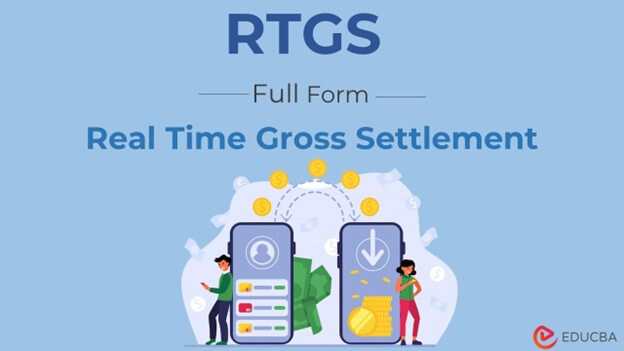Updated February 17, 2023
RTGS Transfer
RTGS (Real Time Gross Settlement) is a highly secure payment system between central banks and financial institutions that has gained more popularity over time, especially in India. This post will highlight some of its key benefits and explore the various licensees working in this domain. There are many benefits of RTGS within the Indian banking industry and other parts of the sector that RTGS has embraced.
Full Form of RTGS
Real-time gross settlement (RTGS) is a real-time payment system to settle large volumes of money transactions. The RTGS system enables the banks to transmit real-time messages to the branches for making payments, transferring funds, etc.
The RTGS system is an electronic network that connects all financial institutions through a computerized network. The messages transfer between the various banks and branches through the RTGS center (RTGC). This system works on pre-defined time schedules and helps in the real-time settlement of funds across multiple banks.
Importance of Real-Time Gross Settlement
Real-time gross settlement (RTGS) is a payment system that allows banks to make payments directly to each other without the need for third-party validation. The RTGS system provides for quick and efficient clearing and settlement of funds. It is in countries where the currency of issue denominates in a foreign currency and where there are large amounts of cross-border transactions between banks of different countries.
The Reserve Bank of India developed the RTGS system in 1993. On a pilot basis in three cities — Mumbai, Delhi, and Kolkata — to enhance efficiency when commercial banks were finding it difficult to handle large volumes of fund transfers from foreign sources into their ATMs.
How Real Time Gross Settlement Works?
Real-time gross settlement (RTGS) is a system that allows banks and other financial institutions to settle transactions in real time. It happens by using an electronic network, which is called an RTGS network. The banks link to each other via this network, where they can settle their transactions instantly.
In this way, there is no need for any paper transaction or money delivery at the bank level. The money will be instantly transferred from one account to another without delay.
RTGS networks benefit large organizations by allowing transactions between institutions to be quick and easy. For example, suppose a customer wants to transfer money from one account to another within an organization. In that case, they can do so through an RTGS network instead of going through traditional methods such as sending a letter or visiting a bank branch or ATM.
Benefits of Real-Time Gross Settlement
The real-time gross settlement provides several benefits to businesses, including:
#1 Reduces Costs
Because payments happen instantly, there’s no need to move funds between accounts to pay bills or make other payments. It reduces costs because it eliminates the need for frequent transfers between accounts, which can cause problems with reconciliation and reporting processes.
#2 Faster Processing Times
Real-time gross settlement transfers happen much quicker than those using manual processes requiring multiple parties to act on behalf of the receiving party. In contrast, manual transfers take days or weeks, while RTGS transfers typically take a few hours to days.
#3 Convenient
Users can operate their businesses without worrying about delays in payments or other issues arising due to out-of-the-ordinary situations like holidays, strikes, or other events that lead to disruptions in financial transactions.
#4 Better Access
The ability for banks to transfer money electronically means they can provide better access to their customers by providing instant access via mobile banking applications or other channels such as kiosks in shops or supermarkets.
Final Thoughts
In conclusion, we have learned the Full Form of RTGS, and we have argued that the real-time gross settlement system is essential to the financial system. It is a system that allows banks to settle transactions in real time without waiting for the money to move through non-real-time systems. It provides for faster and more efficient settlements between banks. In addition, it also allows for certain benefits, such as risk management and settlement of securities, which are not possible with other settlement systems.
Recommended Articles
We hope that this EDUCBA information on “Full Form of RTGS” was beneficial to you. You can view EDUCBA’s recommended articles for more information,

